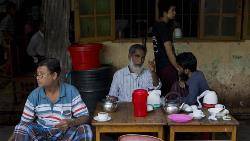An army of 150,000 census-takers started to fan out across Myanmar on Sunday, despite calls from Human Rights groups to postpone the complex questionnaire, fearing it could further stoke ethnic tensions and violence in the region.
The UN-backed project is threatening to reignite problems between Buddhists and Muslims, particularly in Rakhine State in the country's west, and questions on the census form about religion and ethnicity have caused further unease. What's more, as the government tries to secure a nationwide ceasefire with militias, tens of thousands of people living in rebel-controlled land will be off-limits.
Tensions came to the fore this week, when Buddhist mobs attacked aid workers’ homes and offices in Rakhine's capital, throwing stones and forcing workers to flee under police protection.
Rakhine Buddhists object to a persecuted Muslim minority called the Rohingya being included in the census. They insist they should be forced to be recorded as Bengali, a name that enforces the spurious claim that they are illegal immigrants.
Presidential Spokesman Ye Htut said Saturday that Rohingya would not be allowed to classify themselves as such.
"It will be acceptable if they write 'Bengali'... We won't accept them as 'Rohingya,'" he said.
Ethnic groups have also said they will not permit census-takers access to their territory, while others have expressed concern over the impact of the census on their areas. Many minorities say the census could potentially weaken their political representation or claim to ethnicity, if the process undercounts their group.
“The mob attacks in Arakan State illustrate the risks of proceeding with the census in such a volatile atmosphere,” said Brad Adams, Asia director at Human Rights Watch, on Saturday. “The government should suspend the census until it can ensure adequate security and a fair process for everyone involved.”
Arakan State is the previous name of Rakhine State, likewise Burma the previous name of Myanmar.
The last census was conducted in 1983 under a brutal military dictatorship known for manipulating figures to suit its own ends. Rights groups claim it deliberately undercounted Muslims. More accurate figures could reveal a much larger Muslim population than the 4 percent previously reported.
But Myanmar desperately needs a headcount. Estimates of its population vary from 48 million to 65 million, a divergence greater than the number of people living in The Netherlands. And the census should help the reform-inclined government to develop the impoverished country, telling it where hospitals, schools and new roads are needed most.
Supporters argue it is an integral part of reform in a nation crippled for five decades by an opaque dictatorship. The United Nations Population Fund, which along with the United Kingdom, Germany and others is paying for most of the $US75 million project, says the census will help unify the fractured country.
Janet Jackson, the U.N. Population Fund’s senior representative in Myanmar, described the census as “timely and historic” at a press conference last month.
“This is a chance, at least for the next ten years, for each person to tell their story.”
Census workers started moving door-to-door around 7 a.m. Sunday, each armed with little more than 41 questions and a black 2B pencil. By the time the workers - primarily school teachers - finish April 10, they will have travelled through crumbling colonial cities, vast mountain ranges and remote refugee camps, visiting an estimated 12 million households.
PHOTO CAPTION
Myanmar Muslims drink tea in a roadside tea ship in a Muslim neighborhood in Yangon, Myanmar, Sunday, Mar 30, 2014.
AA


 Home
Home Discover Islam
Discover Islam Quran Recitations
Quran Recitations Lectures
Lectures
 Fatwa
Fatwa Articles
Articles Fiqh
Fiqh E-Books
E-Books Boys & Girls
Boys & Girls  Ramadan
Ramadan Fatwa Audios
Fatwa Audios Month of Mercy
Month of Mercy Women
Women Eed Al- Fitr
Eed Al- Fitr Food Recipes
Food Recipes Videos
Videos

 Prayer Times
Prayer Times












